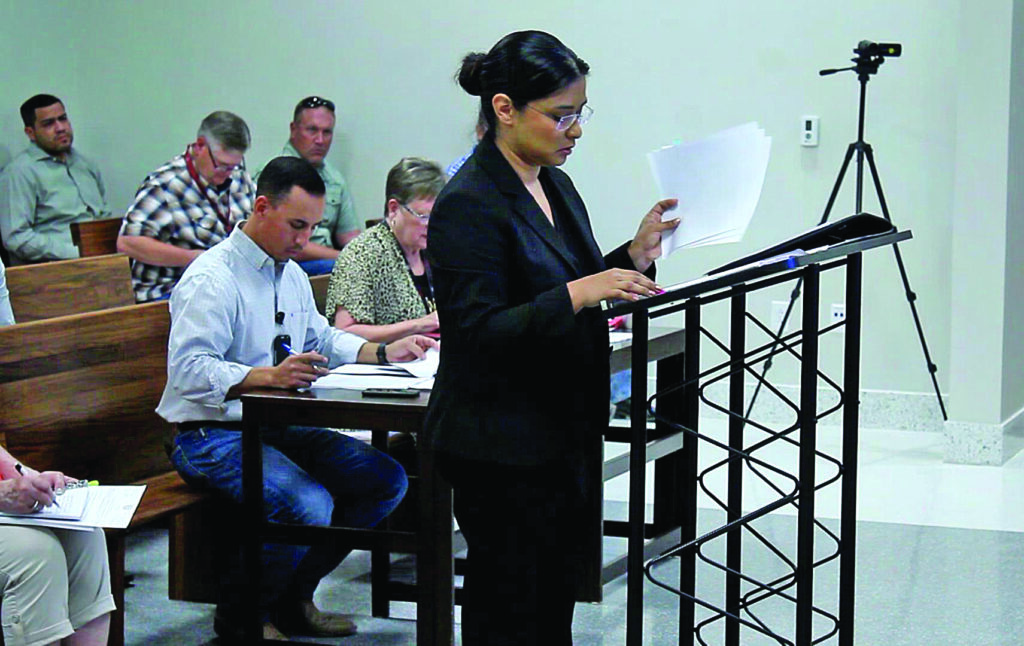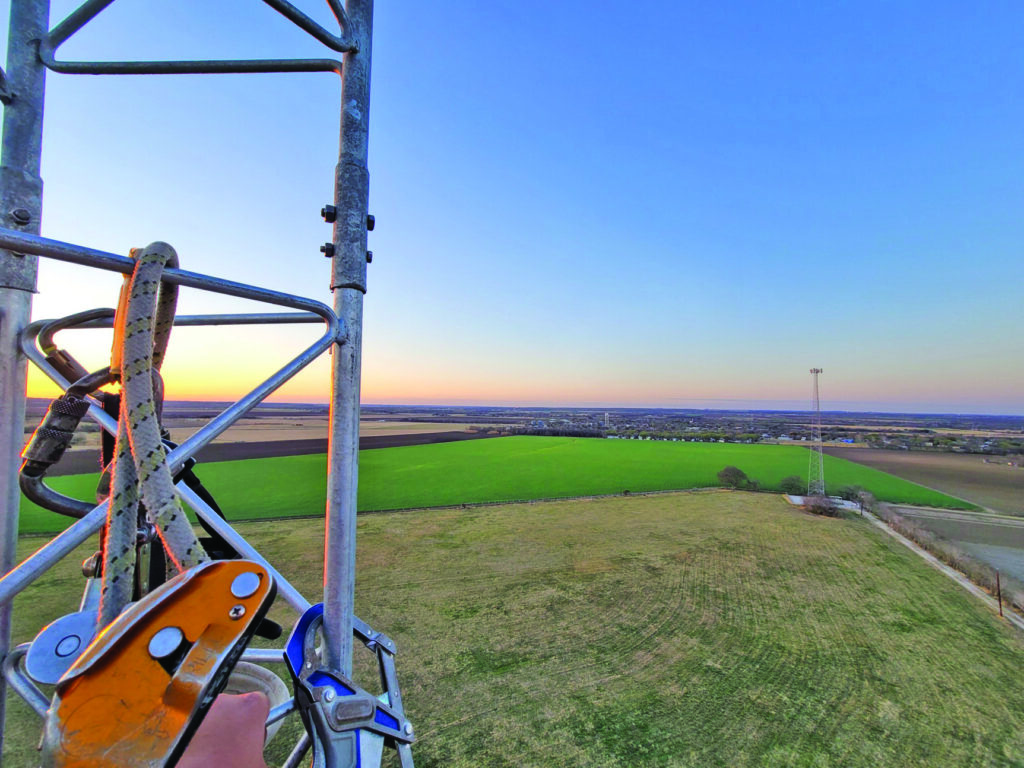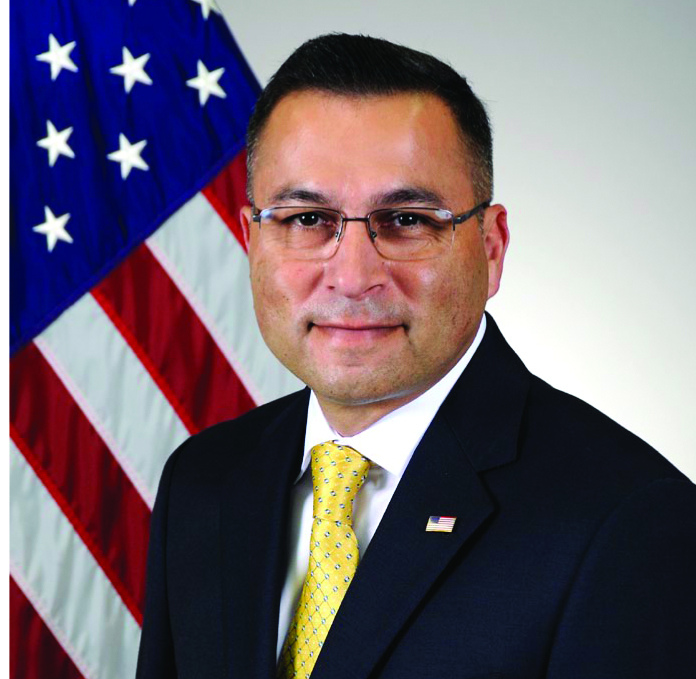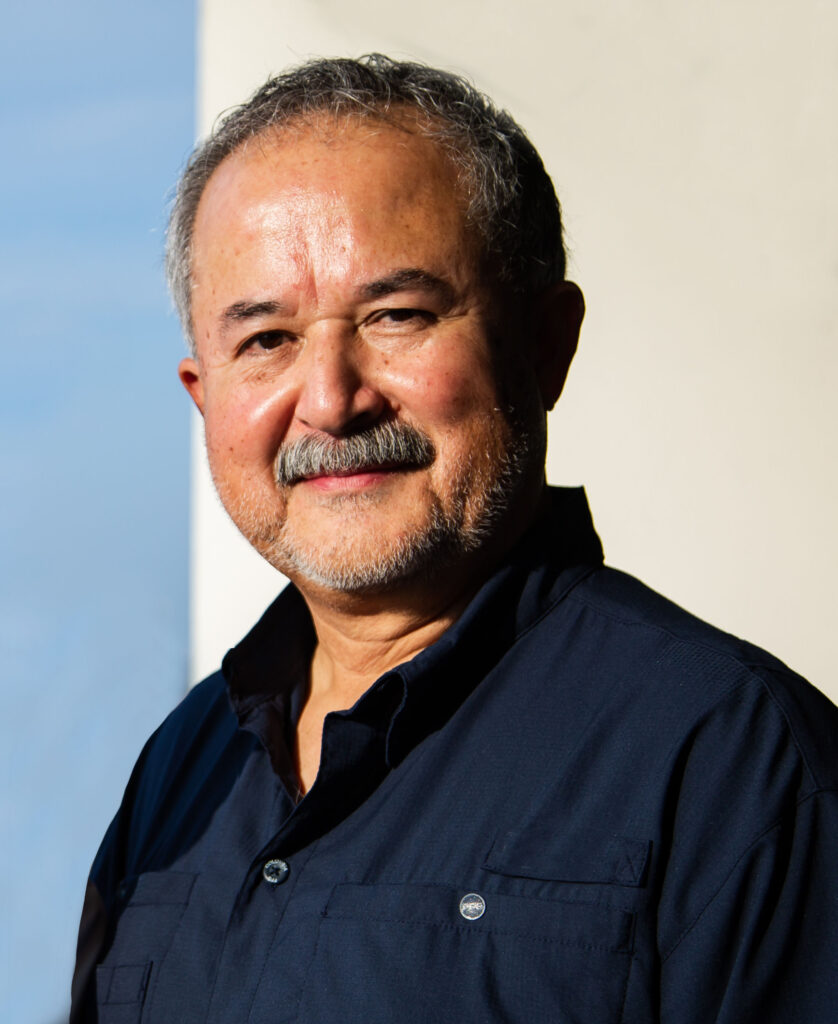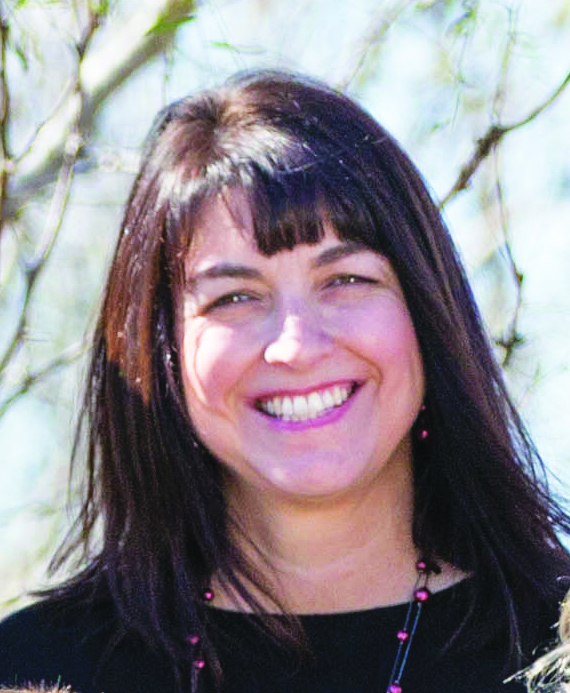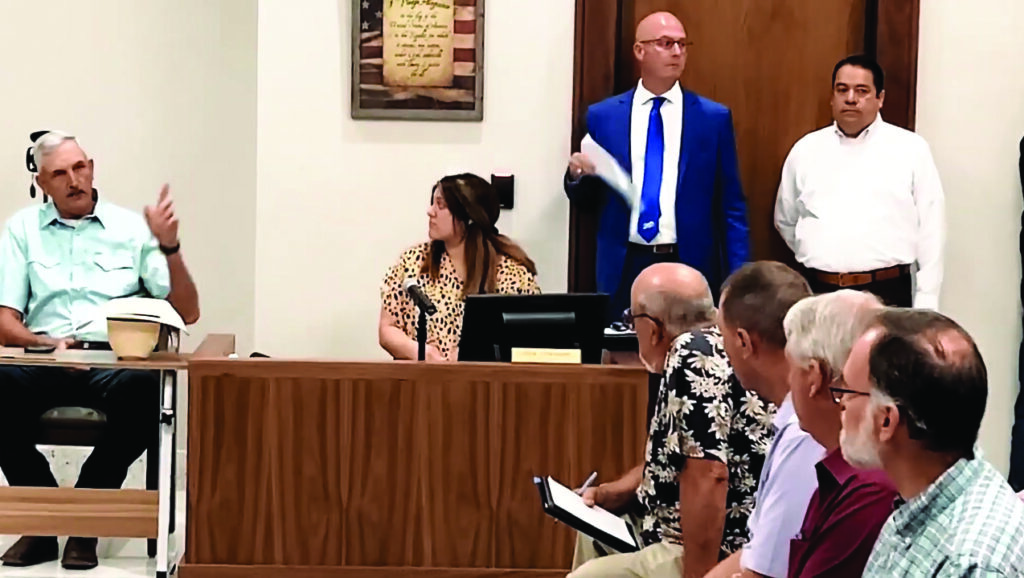
In the wake of the May 24 shooting massacre at Robb Elementary School in Uvalde that left 19 students and two teachers dead, administrators from the several Medina County school districts met with county commissioners to request funding for 1 additional school resource officer be assigned to every school district.
Eric Smith, president of the Natalia school board, led the presentation made during a June 2 regular session of the commissioners’ court.
“I will not throw out fancy stats or figures on school shootings in the U.S. or Uvalde,” Smith said. “I’m pretty sure each of us is aware and it makes us, including me, sick to our stomachs every time we turn on the news.”
Also speaking for the gathered administrators was Shannon Beasley, vice president of the Medina Valley school board.
“It touches us deeply and is what we as trustees and stewards of our students consider the worst nightmare,” Beasley said.
David Lynch, precinct 2 commissioner, led the meeting in the absence of County Judge Chris Schuchart. He emphasized that the SRO request had been added to the court’s agenda solely as a matter of discussion.
“This is not an action item,” he said. “We want to hear your concerns and maybe have a little dialogue.”
“We are all products of Medina County schools,” Lynch added.” Our wives are products of Medina County schools. Our children, our grandchildren are too. So, we understand the need for security and safety as a foremost priority.”
“Also we have been on the phone with Pete Flores and Andrew Murr, who said ‘We have State funding….funding that nobody ever asks for. So that may be another piece to this puzzle,” Lynch said.
He said he was sure Judge Schuchart would want to be on hand for any final decision by the commissioners.
Medina County Sheriff Randy Brown verified that the county at present has six SROs for the entire county, which are all placed at Medina Valley ISD schools. The cost to add a single new officer on board, including training and vehicle, could be nearly $130,000, he estimated. For seven, that’s a little under $1 million dollars ($910,000).
“We need to stop calling them SROs,” Brown said. “They are not school resource officers. We need police in the schools that can do the job.”
Even with immediate approval of such a hire, finding the right person to fill the role will be difficult, he said.
“If we can figure out how to do this I support you 100 percent,” Brown said. “I don’t know where the money is going to come from but our greatest treasurers are in those school buildings.”
“When I was driving back from Uvalde that night, I started checking into costs,” Sheriff Brown said. “We’ve got to do everything we can to make schools are safe as we can for everyone.”
Sheriff stated that “With all the growth in the county, it’s just unbelievable the number of calls we have.”
He noted that he would like to have 7 more deputies on staff. He also stated that in the future he would like to see deputies in schools countywide.
“I don’t need somebody in the schools that calls us. I need somebody in the school that IS us. I know a lot of school districts have approached us and would like to have a deputy on campus.”
“I guarantee you if something happens, we’ll be there. …It’s hard to say we are going to be there in 5 minutes though if we are all the way up on Hwy 16. Someday, I am going to have enough people to divide the county into 4 different quadrants,” he said in hopes that he can have deputies better positioned to help when an emergency arises.
Towards the end of his speech, Sheriff Brown commented, “We can talk and talk and talk….but we need to stop talking and do something.”
Sheriff Brown mentioned there is a COPS grant that has a deadline of June 9, but felt it may be too late for locals to apply. (see separate article)
On hand from Devine ISD were superintendent Todd Grandjean, assistant high school principal Daryl Wendel, school board president Nancy Pepper, board member Ali Buvinghausen and financial resource officer Shannon Ramirez, Harry Piles of Natalia ISD. Board members from the various districts were also present.
Superintendent Grandjean commented that Devine has instituted the Guardian program (which allows certain staff to carry a concealed weapon), and that regional training for other local districts is available.
Smith opened his presentation with a detailed breakdown of the security presently available at schools throughout the county.
“When you look at the six districts here today the largest is Medina Valley with over 7,500 children and eight different campuses, six of which have school resource officers paid for by Medina Valley ISD,” Smith said.
Hondo ISD has one police officer funded by the school district and another locally funded through the city of Hondo, he said. Devine has one SRO officer who travels between all campuses as needed, and the expense is shared by the city, with a majority covered by the school. Like Devine, Hondo is part of the Texas School Guardian Program, an armed defensive approach to active shooters on campus.
Although D’Hanis ISD also has the Guardian program, the district does not include an incorporated city and does not have a school resource officer.
Natalia ISD has one police officer from city police but funded by the district. The district cut short its school year following a Natalia student being charged with terroristic threat.
Lytle ISD has one Medina County sheriff’s deputy who is funded by the school district at a cost of $60,000 annually, Smith said.
“I was happy when I reached out to those six districts that represent Medina County public schools educating 12,000 children and employing over 2,000 staff,” Smith said. “They were in full support of why I am here.”
He noted that this was the second time he had made this request for his school district.
“Several years ago I requested that you would consider looking into possibly giving some kind of tax reduction to offset appraisals that we know you do not control but to try and offset the cost,” Smith said.
The decision at that time was not to go forward with a tax reduction scheme, he said.
“I will not criticize the decision you make in regard to our (latest) request,” Smith said. “I would just ask that you remember 51,000 residents in our county that have 12,000 relatives attending these schools.”
He added that what was being requested was not a luxury “but a necessity.” But, even at that, additional SROs “would not be an end-all solution and would not guarantee our children would not be in harm’s way.”
Following Smith’s presentation, Beasley said Medina Valley ISD has had a strong focus on school safety since 2018. However, discussing in detail security measures in place is not in the best interest of the students.
“Unfortunately, what the media portrays is often not the whole story,” Beasley said. “As any of us elected officials know often things happen that we can’t talk about.”
Commissioners emphasized that the fund balance might look like an easy source of funding when things are going good. However, circumstances can change quickly. That healthy fund balance might make the difference between personnel layoffs or funding important projects, they noted.
“We’re not saying no to anything but our fund balance and the shape that it is in is very important to the commissioners,” Lynch said. “Trying to meet your needs and desires without affecting that is something we’ll have to work through.”
A one-time expense using the fund balance is one thing, he said. However, SRO officers are an ongoing expense.
“That revenue flow is going to have to come from somewhere and it will be the taxpayers that fund that ultimately,” Lynch said.
Beyond county and district funding to initially hire new SROs, permanent funding may be available from the state. Lynch and Larry Sittre, precinct 2 commissioner, said they had been in touch with state Rep. Andrew Murr and state representative candidate Pete Flores about the issue.
“They feel that this is a state funding issue so they would like for representatives of the school districts to reach out and ask for the money,” Lynch said.
Sittre stated, “This commissioners court is probably more pro fund the police than anyone….Pete Flores sent me an article. He sent me a $100 million package that’s been in place for 2 years. In the meantime I contacted Andrew Murr this weekend. The $100 million is available. He said to give them his phone number…..Fill out the paperwork. That’s a fast start, instead of waiting for anyone to okay something in Austin, which I know is probably never gonna take place.”
In reference to last week’s newspaper, which discussed the county’s recent $2.1 million purchase of two new buildings, Sittre noted, “On the $2.1 million spending here, This has nothing to do with the budget, whatsoever. We can’t use that as budget money.”
He also noted that the county’s most recent Audit, which was presented the county a few weeks ago, presents information about county funds from the fiscal year that ended in 2021, (which was noted in the article).
In reference to state funding that Flores and Murr mentioned, Beasley replied that it was unsure if that state funding would go to the counties or directly to the districts. Smith noted that hundreds of districts in the state have no SROs whatsoever, making them the most likely candidates for early funding.
“The way we look at it what we can do today gives us the time to figure this out later,” Smith said. “Even if it is just one year (from the county) it gives us time to go after the state, go after whoever we need to and get extra funding.”
According to Sittre, the funds being targeted from the county to pay for the added SROs would require voter approval under current property tax law.
“This isn’t a one-time thing of ‘I’ll give you $100,000, $200,000 or a half million dollars and it’s over with,” Sittre said. “That money is not in the budget.”
Commisioners Nueman, Lynch and Beck all suggested having workshop or round table sessions between county and school district officials to resolve the issue.
In other action, the commissioners acted various subdivision development projects including preliminary approval of The Enclave at Potranco Oaks, unit 2, located in Precinct 2 off Potranco Road. The commissioners also approved phase three of Hunter’s Ranch subdivision located in Precinct 2 off Potranco Road.
Final approval of Hunter’s Ranch subdivision units nine and 11 off FM 1957 pending action by San Antonio officials was okayed by commissioners. Also, units one and two of the Boehme Ranch subdivision in Precinct 2 off County Road 466 received court approval.
The court voted to accept a $1 million construction bond for Valley Oaks subdivision, phase 1, in Precinct 1 off CR 241. Also approved was a replat of several lots in the Valentine Ranch subdivision, phase 1, in precinct 1 off Park Road 37.
Likewise, the commissioners gave preliminary approval to replat several lots in the San Martin Hills subdivision, unit 2, located in Precinct 1 off CR 241.
Regarding Medina County Emergency Services District No. 1 in Castroville, the commissioners voted to approved the resignation of Pamela Mathis to be replaced by Jenny Ferren.
By Anton Riecher and Kayleen Holder
